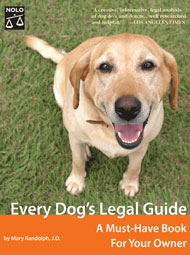How Many Dogs Can You Keep?
In rural areas, how many dogs you keep is pretty much your own business, as long as the dogs aren't a nuisance. But many cities restrict residents to two or three dogs per household, not counting puppies less than a certain age, usually eight weeks to four months or so.
The goal is to cut down on the problems that dogs cause in urban areas. As one court upholding such an ordinance put it, “too many dogs in too small a space may produce noise, odor and other conditions adverse to the best interests of the community as a whole.”3 Court challenges to such ordinances almost always fail, but there are exceptions: A county judge in Minnesota ruled that a Sauk Rapids ordinance limiting dog ownership was invalid because it wasn't based on any supporting facts.4 And the Georgia Supreme Court found a county ordinance unconstitutional because it didn't include the criteria that a dog owner had to satisfy in order to get a permit for keeping more than four dogs.5
Violating the law will probably earn you a fine and possibly even a jail sentence. A judge in Holland, Michigan - which has a two-dog-per-household maximum - sentenced a man to 90 days in jail for refusing to give up any of his three dogs. The dog owner spent a few days in jail before agreeing to part with one of his animals.
Flat limits on the number of dogs per household are increasingly popular but are by no means universal. In Oakland, California, dog owners banded together to defeat a proposed ordinance that would have required people with more than three pets to get a city permit. The pet owners were joined by the Oakland Society for the Prevention of Cruelty to Animals and a local American Civil Liberties Union chapter.
There are variations on this kind of straightforward limit. You may, for example, have to get a special kennel license if you have more than three or four dogs. That means extra fees, rules and, often, inspections by city officials.
You may wonder how these rules are enforced. After all, animal control officials don't (at least not yet) go door to door taking a dog census. They rely, for the most part, on complaints or chance observation. So as a practical matter, someone who has more dogs than is allowed under the law is likely to get in trouble only if the dogs cause problems and a neighbor complains. The moral: no matter how many dogs you have, don't let them be a neighborhood nuisance. And if there are problems, work them out before the neighbors go to the authorities.
Even if a city doesn't have a set limit on the number of animals, neighbors bothered by too many animals may sue. If a court decides that the animals are a nuisance - that is, that they interfere with neighbors' enjoyment of their property - the owner may be ordered to get rid of some animals (See Barking Dogs).
